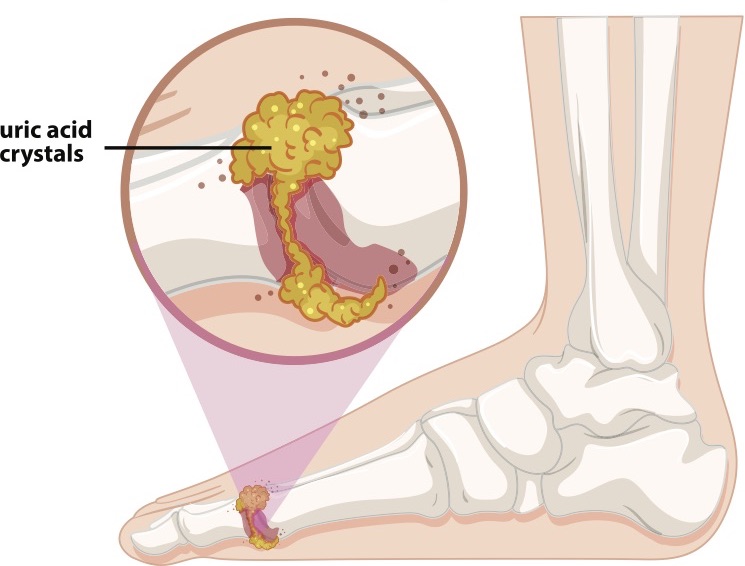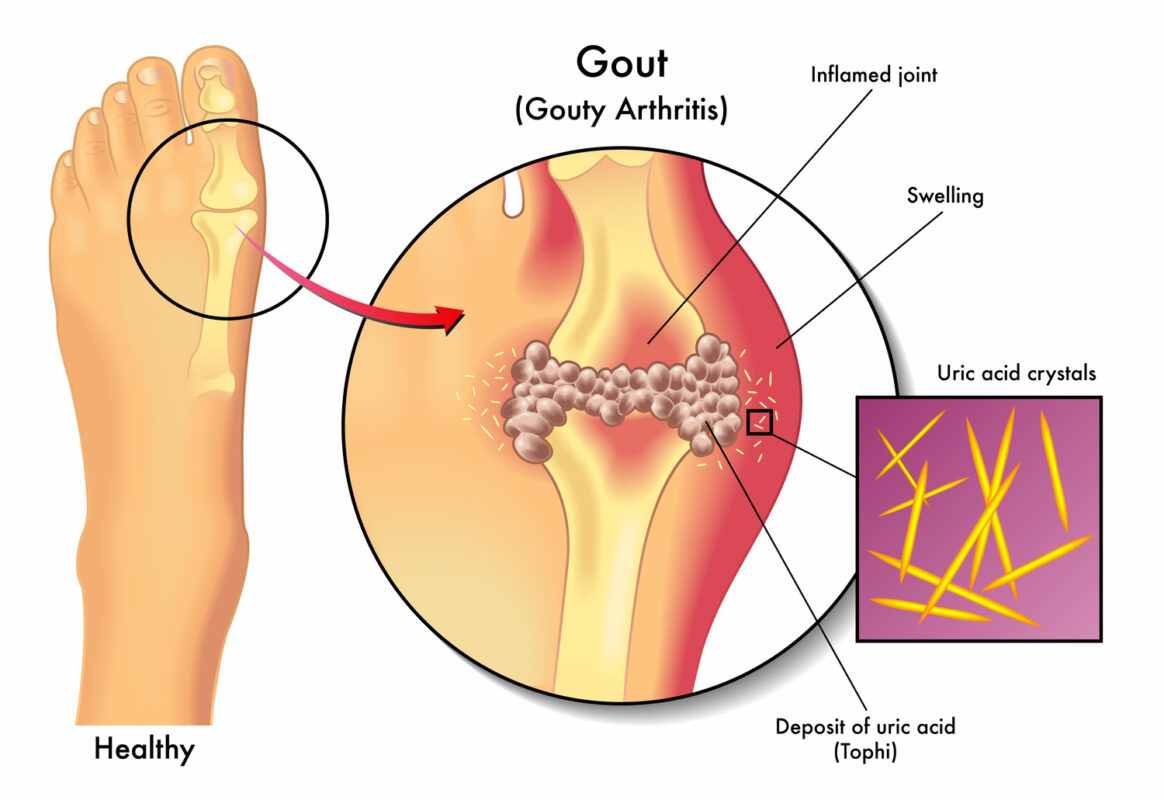According to research, gout affects approximately 9.2 million individuals in the US. Moreover, you will find this disease more frequently in males than females. You might have gout if you have joint pain, redness, swelling, or soreness, most frequently in your big toe.
Medicine can be used to help in the prevention of flare-ups in the million cases of gout that occur annually in the United States.
These attacks that a patient experiences from gout are quite painful and can happen suddenly. Moreover, these attacks are frequent at night time.
Redness, soreness, and swelling occur when one or more of your joints experience an abrupt pain assault. Big toe flare-ups are common, but they can also affect your knees, fingers, or wrists.
The buildup of urate crystals in the joint is what causes gout. The inflammation and excruciating pain that characterizes a gout flare-up are brought on by this accumulation.
Purines, which are organic materials in your body, are broken down by your body to form uric acid. Foods like red meats, as well as shellfish like mussels, trout, sardines, scallops, tuna, or anchovies contain purines.
Urate crystals grow in your joints when your body creates too much uric acid or when your kidneys do not release enough. This causes inflammation and extreme pain in your joints.
In this blog, you will learn some of the important facts about gout, what gout, what causes gout, etc. Moreover, you will also get to know about gout medication and how it can be treated. So, let’s proceed to learn more:
What is Gout?
Gout is a form of arthritis that causes inflammation, pain, stiffness, and redness in the joints. The big toe joints are typically the first to be affected by gout, which then gradually spreads to other joints.
Your sleep may be disturbed by gout flare-ups, which often happen in the middle of the night. Here are some signs of a gout flare-up that you might be going through:
- The joint pain becomes so severe that it feels like it is on fire, and the area around the joint becomes irritated, swollen, and painful.
- You can feel some pain for up to a few weeks after the severe pain goes away. If this isn’t your first episode, the gout will probably worsen and linger longer.
Gout is a painful and potentially debilitating form of arthritis that has been recognized for centuries. Despite its historical recognition, many people are still unaware of the causes, symptoms, and effective treatments for gout.
In this blog, we will cover the essential facts about gout, covering facts such as its symptoms, causes, and available treatments, including medication and gout removal.
Gout is a type of arthritis characterized by sudden and severe attacks of pain, redness, and swelling in the joints, often affecting the big toe. These attacks are typically accompanied by a sensation of extreme heat and tenderness.
Gout is caused by the buildup of uric acid crystals in the affected joints, which leads to inflammation and intense pain. This condition can significantly impact a person’s quality of life if left untreated.
Gout Symptoms
Understanding the gout symptoms is crucial for early diagnosis and effective management. Common gout symptoms include:
Intense Joint Pain
Gout typically starts with sudden, severe pain in a joint, often the big toe. The pain can be excruciating and may last for several hours or even days.
Swelling and Redness
Affected joints become swollen, red, and tender to the touch, making even simple activities like walking or wearing shoes painful.
Limited Mobility
During a gout attack, joint mobility is severely restricted due to the pain and inflammation.
Recurrent Attacks
Gout often presents as recurring attacks, with symptom-free periods in between. The frequency and duration of these attacks can vary from person to person.

gout disease
What Causes Gout?
Gout is primarily caused by an excess of uric acid in the body, a condition known as hyperuricemia. Uric acid is a natural waste product formed when the body breaks down purines, which are found in certain foods and are also produced by the body. Several factors contribute to the development of gout, including:
- Diet: Consuming high-purine foods such as red meat, seafood, and alcohol can increase uric acid levels.
- Genetics: Gout can run in families, indicating a genetic predisposition.
- Obesity: Being overweight can increase the risk of gout as excess body fat can lead to higher uric acid levels.
- Medical Conditions: Certain medical conditions, such as kidney disease and high blood pressure, can increase uric acid levels and contribute to gout.
Gout Treatment
The good news is that gout can be effectively managed and treated. Gout treatment options include:
- Medication: Gout medications are designed to relieve pain during an acute attack and reduce uric acid levels to prevent future attacks. Common medications include nonsteroidal anti-inflammatory drugs (NSAIDs), colchicine, and corticosteroids.
- Diet and Lifestyle Changes: Adopting a diet low in purine-rich foods, maintaining a healthy weight, and reducing alcohol consumption can help manage gout.
- Gout Removal: In severe cases or when medication and lifestyle changes are not effective, a procedure known as arthrocentesis may be performed to remove excess uric acid crystals from the affected joint.
Gout is a painful and potentially debilitating form of arthritis that can significantly impact one’s quality of life. Recognizing the symptoms and understanding the causes of gout is crucial for early diagnosis and effective management.
With the right treatment, including medication and lifestyle changes, those suffering from gout can find relief and enjoy an improved quality of life.
In severe cases, gout removal procedures may be considered. If you suspect you have gout or experience any of the symptoms mentioned, it’s essential to consult a healthcare professional for a proper diagnosis and personalized treatment plan.
Fuse Infusion offers Biological Infusion Therapy for Gout Treatment.
Infusion treatment is one of the treatment options for gout symptoms. The good news is that Fuse Infusion provides infusion therapy close to you.
A biologic infusion treatment facility, Fuse Infusion, provides biologic infusion therapy and other treatments to help people recover from chronic illnesses. Our facility employs skilled and knowledgeable personnel.
You will receive care in a secure setting. To learn more, call us at 914-460-4891 right away! or visit Fuse Infusion.

